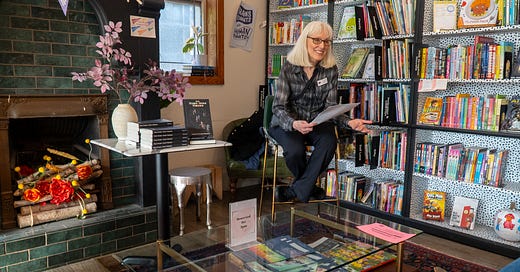Ever since I began using a word processor to write (long ago), I’ve scoffed at the idea that writing on paper has superior cognitive benefits. Please don’t send me links to all the scientific proof. I simply don’t care. I never write anything by hand if a keyboard is handy. I wouldn’t be able to read it anyway.
I don’t scoff at people who write on paper. Maybe they feel pressure watching a blinking cursor, or are flummoxed by tech, or don’t like to type. Maybe they’re romantics with a fetish for the touch and feel of paper. Maybe they love walking around with all their superior comprehension and retention.
But my job required expertise in MS Word, and it long ago became automatic to me. Writing, rewriting, editing, organizing, formatting, exporting - I can’t even remember how we used to do all that on paper. When I’m feeling blocked, a walk or workout gets me back on track.
Until last week, that is. After weeks of staring at the computer and failing to work out a major plot problem, I was desperate, so I went to a room away from the screen and sat down with paper and pencil. Within a half hour, all became clear!
I don’t mind if you gloat. I’m not giving up my primary MO, but I’m keeping this weird little miracle in my pocket for next time.
Recent Doings
In April after months of inactivity, suddenly I was all over the internet and radio! Some high-profile newsletter writers have a list like this every month, but I promise you: I do not.
Most of this happened only because I frantically pitched stuff for weeks ahead of launching The Time-Jinx Twins. I would be happy never to do that again, even though it resulted in some good publicity and enjoyable experiences.
Short, fun appearance on “WEFT Weekender” 90.1 FM talking about music and writing with Vicki and Mike Niswander. (14:38 min.)
Long, twisty conversation with Suki Wessling at The Babblery, “Writing into the Future of Kidlit with Carol Fisher Saller,” on transitioning from traditional to indie/hybrid publishing, writing diverse characters in fiction, why we write, and more. (56:57 min.) Short excerpt, courtesy Public Radio Exchange (PRX): “Minibabble: Carol Fisher Saller on Inclusivity in Children's Fiction.” (14:45 min.) [NB: This appearance came about via Varia, the two-woman marketing company I hired to help with the book launch.]
“UI Alum Publishes New Novel ‘The Time-Jinx Twins,’ Explores Limits of Children’s Fiction” [Ahem - their words, not mine], by Sam Gregerman, The Daily Illini, April 25, 2025.
On the faculty at “Me Publishing Me,” a one-day intensive by the Midwest Writers Workshop. I highly recommend the MWW’s Summer Conference (July 10-12). As always, it will focus on craft.
My book launch at The Literary Bookbar in Champaign, Illinois! A perfect bookstore, lovely staff, ideal book-talk space. I chose it because a good part of The Time-Jinx Twins is set on the University of Illinois at Urbana-Champaign campus.
Books I Enjoyed (in random order)
James, by Percival Everett (2024).
Milkman, by Anna Burns (2018).
Abzuglutely!: Battling, Bellowing Bella Abzug, by Sarah Aronson, illustrated by Andrea D’Aquino (2024).
Guide to Writing the Mystery Novel: Lots of Examples, Plus Dead Bodies, by Barbara Gregorich (2014).
May-June Goals
Go on vacation without my laptop.
Wrestle with a big dilemma. (More on that next time, depending on who wins.)






I have an alternate explanation for your paper-based epiphany, Carol. Brain research says that when you're stuck in a thought loop, the best thing you can do is to change your physical environment. You went from a process that is purely cerebral (those of us who have been typing our whole lives don't have to think about the typing) to one that is probably (if you're like me) physically awkward at this point. Just making that physical change pulled your brain out of the cycling it was doing. I tell my students when they feel stuck to make sensory changes. At the very least, take their hands off the keyboard and gaze out a window into the distance. Much better, run up and down stairs. The best, go outside without a device and just let their brain relax. All that said, yes, there is research about handwriting vs. typing, but it was done on adults who had grown up handwriting. I wonder what that research would look like done on digital natives!
It's similar for me (also an experienced editor who knows her way around MS Word). When I try and write on the PC, my temptation is to edit as I go along, and that always spoils my flow. With a piece of paper in front of me, I can keep writing for so much longer.